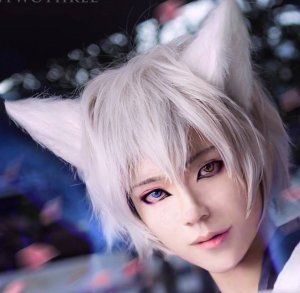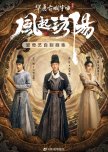Secretive Intense Fast-moving
I’m intrigued by the background setting of this story. Adapted from a popular novel by Ma Bo Yong, the same author for Longest Day in Chang’an and Secret of Three Kingdoms, this story is set towards the end of the first female emperor’s, Wu Zetian’s, rule around 703 – 705 in Luoyang. Like the other earlier dramas, this drama is fast paced and heart-poundingly intense. The nail-biting story is abound with mysteries, conspiracies and hidden villains, layers after layers with multiple meanings for interpretation.
The author brilliantly mixes fiction and non-fiction together creating a fascinating story. The plots and sub-plots may be fictional, but many of the people and places, with probably the exception of the main characters, are real historically. Having said that, the names of the main characters could have been adopted from real people during the era but unrelated to the events (for example, Wu Siyue has rather similar homophones to Wu Zetian’s father’s name, Wu Shiyue).
It would be a fascinating watch if viewers are equipped with some understanding of the background setting so that all the elements in the drama, big and small, including dialogues and events, become interesting clues as the story unfolds. As it goes, the background becomes pivotal for the enjoyment of the viewers and I’d like to provide a brief explanation here.
After the death of her husband, Emperor Gaozong/Li Zhi, Wu Zetian maneuvered swiftly, created her own dynasty, Zhou, and soon proclaimed herself the emperor, basically taking over the throne from the Li family despite her own sons who were still the rightful heirs to the throne under the Li lineage. These have created various factions, with conflicts between the loyalties to the Li lineage and Wu’s family and followers. In the drama, we see these two factions at each other’s throat, jumping at any opportunities to put their opponent to death, for example, the King of Jin, Wu Shenxing (NingWentong), constantly pits against the Crown Prince Li Dun, and he him. The politics and infighting were enormous and deadly, which are captured vividly. It is under this setting that the story becomes captivating and rich. The hidden undercurrents propel the plot: who is the ultimate villain? Is it the Li’s trying to wrangle back power from the hands of Wu, or is it the Wu’s clan trying to legitimize their claim to the throne and pass on to their future generation, or is it someone else?
The story begins with the whistleblowers, who are historically real, risking their lives to try to send a secretive message to the Emperor. Before Wu Zetian came to power, the informant system was in existence to gather information on opposing forces to the throne. The use of secret boxes for the informants to submit information is rather similar to today’s suggestion boxes. Ironically, the inventor of the secret box was eventually executed as he was accused of his involvement in a rebellion through the system he had invented. This is rather similar to the case of Louis XVI, the last King of France, who was decapitated by the guillotine that he had invented.
The first episode where the three main leads are introduced is rather haphazard with fast moving events, sometimes in slow motion and camera work flying everywhere causing confusion and head spinning (at least for me). However, thereafter, such haphazardness almost evaporates and is replaced by seriousness and absorbing story telling.
Though romance is not the focus here, it does brush on light romance with Baili Hongyi (Wang Yibo) who initially opposes to a marriage arranged by his father, but gradually falling in love with his wife, and Gao Bingzhu (Huang Xuan) and Wu Siyue (Song Qian/Victoria Song) developing mutual admirations and love for each other.
Huang Xuan is a veteran actor and his acting skills are solid. He brings out the turmoil of his character, in his avenge for his buddies and the woman who has helped him countless times. Huang Xuan is convincing in all his roles, as a low life or as an investigative spy in the secret service. I like Song Qian’s acting too. As Wu Siyue, she is righteous, trusted by the Emperor and the Crown Prince, and abides to the book, Song Qian gives the viewers a wonderful performance here. Behind the scene, Wang Yibo is well known for being rather quiet with a cold look which fits the Bali Hongyi character very well and his acting captures the essence of the character, giving the viewers a lovable performance.
My Verdict
Luoyang is the ancient capital of China's thirteen dynasties. With such a location, this is an intriguing watch. Exciting and nail-biting. Starts with a head spinning fast pace in episode one, each episode is laced with danger and hidden conspiracies, one twist after another. This is a big budget production with not only great actors, the attention to details is immaculate, from costumes to headgears, everything is said to be as close to the real thing as possible. Accordingly, the production has prepared, among others, more than 5,000 sets of costumes with accessories, and more than 15,000 sets of props, striving to show the prosperous scene of Luoyang in the heyday of Tang Dynasty.
This drama has a great start. Unfortunately, like most Chinese dramas, it dwindles towards the ending. In fact, the ultimate villain seems to be rather haphazard and illogical to the overall plotting.
It is still a great watch for me, but with a giant plot mismatch ending, I'm afraid it's not a perfect one.
The author brilliantly mixes fiction and non-fiction together creating a fascinating story. The plots and sub-plots may be fictional, but many of the people and places, with probably the exception of the main characters, are real historically. Having said that, the names of the main characters could have been adopted from real people during the era but unrelated to the events (for example, Wu Siyue has rather similar homophones to Wu Zetian’s father’s name, Wu Shiyue).
It would be a fascinating watch if viewers are equipped with some understanding of the background setting so that all the elements in the drama, big and small, including dialogues and events, become interesting clues as the story unfolds. As it goes, the background becomes pivotal for the enjoyment of the viewers and I’d like to provide a brief explanation here.
After the death of her husband, Emperor Gaozong/Li Zhi, Wu Zetian maneuvered swiftly, created her own dynasty, Zhou, and soon proclaimed herself the emperor, basically taking over the throne from the Li family despite her own sons who were still the rightful heirs to the throne under the Li lineage. These have created various factions, with conflicts between the loyalties to the Li lineage and Wu’s family and followers. In the drama, we see these two factions at each other’s throat, jumping at any opportunities to put their opponent to death, for example, the King of Jin, Wu Shenxing (NingWentong), constantly pits against the Crown Prince Li Dun, and he him. The politics and infighting were enormous and deadly, which are captured vividly. It is under this setting that the story becomes captivating and rich. The hidden undercurrents propel the plot: who is the ultimate villain? Is it the Li’s trying to wrangle back power from the hands of Wu, or is it the Wu’s clan trying to legitimize their claim to the throne and pass on to their future generation, or is it someone else?
The story begins with the whistleblowers, who are historically real, risking their lives to try to send a secretive message to the Emperor. Before Wu Zetian came to power, the informant system was in existence to gather information on opposing forces to the throne. The use of secret boxes for the informants to submit information is rather similar to today’s suggestion boxes. Ironically, the inventor of the secret box was eventually executed as he was accused of his involvement in a rebellion through the system he had invented. This is rather similar to the case of Louis XVI, the last King of France, who was decapitated by the guillotine that he had invented.
The first episode where the three main leads are introduced is rather haphazard with fast moving events, sometimes in slow motion and camera work flying everywhere causing confusion and head spinning (at least for me). However, thereafter, such haphazardness almost evaporates and is replaced by seriousness and absorbing story telling.
Though romance is not the focus here, it does brush on light romance with Baili Hongyi (Wang Yibo) who initially opposes to a marriage arranged by his father, but gradually falling in love with his wife, and Gao Bingzhu (Huang Xuan) and Wu Siyue (Song Qian/Victoria Song) developing mutual admirations and love for each other.
Huang Xuan is a veteran actor and his acting skills are solid. He brings out the turmoil of his character, in his avenge for his buddies and the woman who has helped him countless times. Huang Xuan is convincing in all his roles, as a low life or as an investigative spy in the secret service. I like Song Qian’s acting too. As Wu Siyue, she is righteous, trusted by the Emperor and the Crown Prince, and abides to the book, Song Qian gives the viewers a wonderful performance here. Behind the scene, Wang Yibo is well known for being rather quiet with a cold look which fits the Bali Hongyi character very well and his acting captures the essence of the character, giving the viewers a lovable performance.
My Verdict
Luoyang is the ancient capital of China's thirteen dynasties. With such a location, this is an intriguing watch. Exciting and nail-biting. Starts with a head spinning fast pace in episode one, each episode is laced with danger and hidden conspiracies, one twist after another. This is a big budget production with not only great actors, the attention to details is immaculate, from costumes to headgears, everything is said to be as close to the real thing as possible. Accordingly, the production has prepared, among others, more than 5,000 sets of costumes with accessories, and more than 15,000 sets of props, striving to show the prosperous scene of Luoyang in the heyday of Tang Dynasty.
This drama has a great start. Unfortunately, like most Chinese dramas, it dwindles towards the ending. In fact, the ultimate villain seems to be rather haphazard and illogical to the overall plotting.
It is still a great watch for me, but with a giant plot mismatch ending, I'm afraid it's not a perfect one.
Was this review helpful to you?


 1
1 5
5 1
1



















